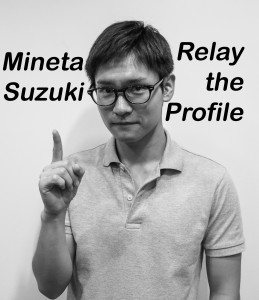Column by Mineta Suzuki
In September, Japan implemented a constitutional change regarding collective self-defense. Prime Minister Abe “reinterpreted” the war-renouncing Article 9 of the Constitution, which had long been deemed the most significant negative legacy from the war. Since then, Japan has taken steps toward militarization so that the Japanese government can deploy forces when allies are in danger. Focusing on the prospect of opposition from Japanese youth, international Japanese student Mitsuki Fujio ’19 shared his thoughts.
MS: Do you think that the media pays a lot of attention to this issue?
MF: Yes, because this may [currently] be the biggest issue in Japan. As a country that suffered from the nuclear bomb, we never want to have a war again.
Have you discussed this issue with your friends and family?
My mom sent me an email, talking about how I should act if the Japanese government requires people to be deployed in any area. She said that if staying in the U.S. is safer, I should stay here, even if that means ditching my family.
How would you describe young people’s attitudes toward the constitutional change?
There is one student group called SEALDs [Students Emergency Action for Liberal Democracy]. They are complaining about the approval of this bill, but they are too extreme in their argument, so young people are still not flexible in [their] discussion … just insisting [on] their [own] arguments.
Have you seen any online posts or blog entries about this issue?
I saw some official articles from newspapers online, and sometimes my friends post their personal opinions.
What kind of role do you think the Internet plays, in terms of people’s reactions?
I think that the Internet has both positive and negative effects. While [online media] can let people know about issues, people can speak their opinions anonymously … and irresponsibly.
Recently, the government has also decided to reduce the social science and humanities departments at many national universities. How do you think this decision will influence the public?
Learning the humanities is important in forming your opinions logically … because you read and write intensively about one issue. The lack of [this type of] education will do exactly the opposite.
There are reports that people will be drafted based on their social class, meaning the government will give financial support to those who would study in military schools. What do you think about this?
My high school wasn’t designed for students who want to go to army schools, so I don’t know any examples, but when it comes to people who are not rich … or who need money to go to school, I think people will probably choose to go to the [military] schools.
Online anonymity has always been around but the increasingly political role—or apolitical role—that the web is playing is new. Although Fujio mentioned a positive side of the Internet, I believe the Internet has become a mere space to share complaints, rather than an epicenter of resistant initiatives.
As in Fujio’s family, in general there is a sense of fear, but it rarely leads to real action. Young citizens seem to keep their spearhead at the government only on a virtual level. Despite the infrastructure for demonstrations, such as rentable offices and printers for signs in convenience stores, their criticism ends on the Web. I’ve seen angry Facebook posts, but not many posters in my neighborhood in Tokyo.
By downplaying the youth’s solidarity on the Internet, I don’t mean to dismiss the importance of SEALDs. In fact, the social pressure to prevent their campaign is greater than ever. Several government officials rebuked the organization as amateur and emphasized that participating in the campaign will have adverse effects on job hunting. Though small in scale, the SEALDs’ demos have been broadcasted several times and provoked controversy. For me, the extremity in their argument that Fujio emphasized is also essential to shake the young public out of political apathy. With the voting percentage of young voters decreasing, a political specimen like SEALDs is more and more valuable.




















































